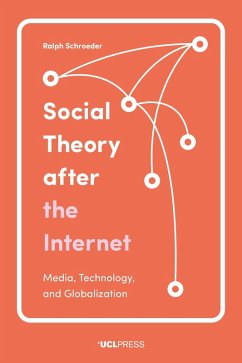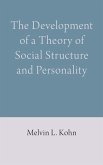The internet has fundamentally transformed society in the past 25 years, yet existing theories of mass or interpersonal communication do not work well in understanding a digital world. Nor has this understanding been helped by disciplinary specialization and a continual focus on the latest innovations. Ralph Schroeder takes a longer-term view, synthesizing perspectives and findings from various social science disciplines in four countries: the United States, Sweden, India and China. His comparison highlights, among other observations, that smartphones are in many respects more important than PC-based internet uses.
Social Theory after the Internet focuses on everyday uses and effects of the internet, including information seeking and big data, and explains how the internet has gone beyond traditional media in, for example, enabling Donald Trump and Narendra Modi to come to power. Schroeder puts forward a sophisticated theory of the role internet plays, and how both technological and social forces shape its significance. He provides a sweeping and penetrating study, theoretically ambitious and at the same time always empirically grounded.
The book covers key contemporary debates in a clear and accessible way. It will be of great interest to students and scholars of digital media and society, the internet and politics, and the social implications of big data.
Praise for Social Theory after the Internet'Schroeder reveals some interesting facts concerning interaction with content posted on social media [in] Tethered togetherness, The spread of social media, Sociability and social divides, Visual copresence, Alone or together and Globalizing sociability.'
Medijske Studije
'A highly ambitious contribution that allows us to take a step back and to systematically think of digital media's contribution to social change in different social systems and its boundedness on country-specific contexts.... Schroeder's book is a highly valuable addition to the literature'
The International Journal of Press/Politics
Social Theory after the Internet focuses on everyday uses and effects of the internet, including information seeking and big data, and explains how the internet has gone beyond traditional media in, for example, enabling Donald Trump and Narendra Modi to come to power. Schroeder puts forward a sophisticated theory of the role internet plays, and how both technological and social forces shape its significance. He provides a sweeping and penetrating study, theoretically ambitious and at the same time always empirically grounded.
The book covers key contemporary debates in a clear and accessible way. It will be of great interest to students and scholars of digital media and society, the internet and politics, and the social implications of big data.
Praise for Social Theory after the Internet'Schroeder reveals some interesting facts concerning interaction with content posted on social media [in] Tethered togetherness, The spread of social media, Sociability and social divides, Visual copresence, Alone or together and Globalizing sociability.'
Medijske Studije
'A highly ambitious contribution that allows us to take a step back and to systematically think of digital media's contribution to social change in different social systems and its boundedness on country-specific contexts.... Schroeder's book is a highly valuable addition to the literature'
The International Journal of Press/Politics
Dieser Download kann aus rechtlichen Gründen nur mit Rechnungsadresse in A, D ausgeliefert werden.









